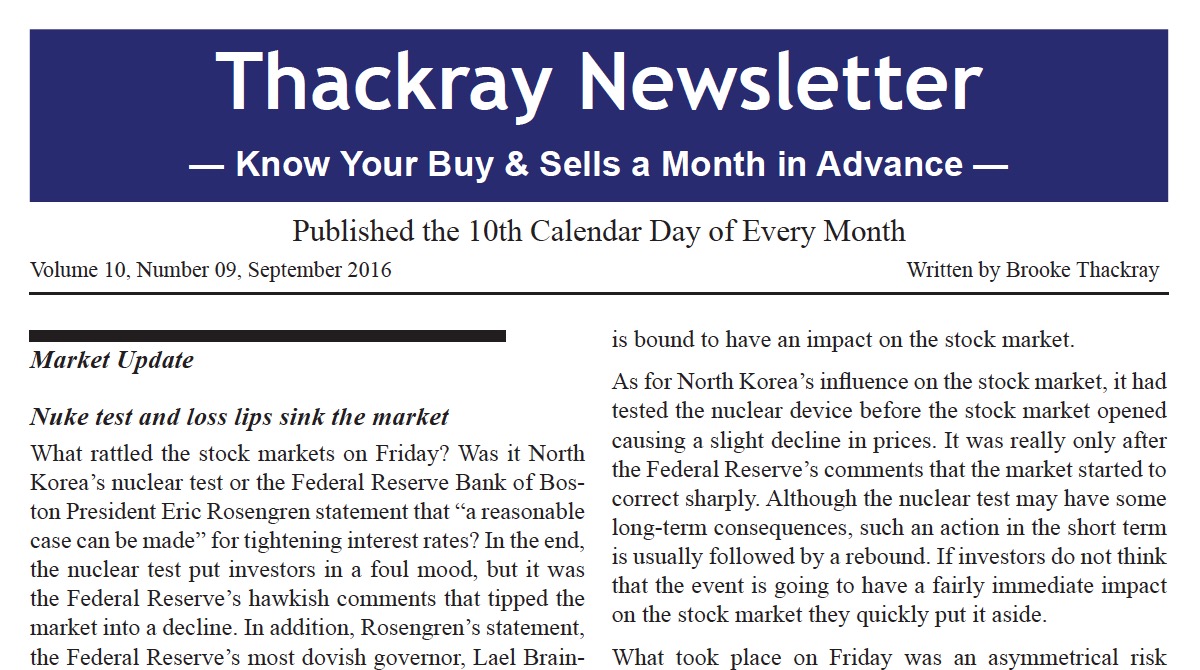Market Update
Nuke test and loss lips sink the market
by Brooke Thackray, Alphamountain Investments
What rattled the stock markets on Friday? Was it North Korea’s nuclear test or the Federal Reserve Bank of Bos- ton President Eric Rosengren statement that “a reasonable case can be made” for tightening interest rates? In the end, the nuclear test put investors in a foul mood, but it was the Federal Reserve’s hawkish comments that tipped the market into a decline. In addition, Rosengren’s statement, the Federal Reserve’s most dovish governor, Lael Brainard, will be making a previously unannounced speech Monday at The Chicago Council on Global Affairs. When such a dovish governor makes an unannounced speech, it is bound to have an impact on the stock market.
As for North Korea’s influence on the stock market, it had tested the nuclear device before the stock market opened causing a slight decline in prices. It was really only after the Federal Reserve’s comments that the market started to correct sharply. Although the nuclear test may have some long-term consequences, such an action in the short term is usually followed by a rebound. If investors do not think that the event is going to have a fairly immediate impact on the stock market they quickly put it aside.
What took place on Friday was an asymmetrical risk adjustment. Asymmetrical risk can be defined as a disconnect between the potential gain and loss, where one is greater than the other. I have previously written about asymmetrical risk as it applied to Brexit. Heading into the Brexit vote, the polls were suggesting a 50-50 possibility of Britain seceding from the European Union. But almost everybody was acting collectively as if there is no chance Britain would leave. In this scenario, a disproportionate amount of risk existed on the downside versus the up- side. If Britain had elected to stay in the European Union it would have been very small rally in the stock market as that scenario was expected in the financial markets. When Britain decided to leave the European Union the stock market corrected sharply. Investor expectation did not match the risk that was established in the polls and investors got caught on the wrong side of the trade.
Ironically, I was going to write about asymmetrical risk in the newsletter before Friday’s event. Leading into Fri- day there was a huge expectation that the US Federal Reserve would not raise its rate later this month or even in December and this expectation had already been priced into the market. In this scenario, there is very little gain to be made if the US Federal Reserve supports its dovish stance. There is more to be lost if the Federal Reserve starts to become hawkish and that is exactly what happened on Friday.
There is a difference between the Brexit outcome and the increased possibility of the US Federal Reserve raising rates. In the Brexit situation investors quickly realized that after the vote, there would not be any action taken to leave the EU for up to two years. This is a lifetime in the investing world. Investors quickly bid up stocks past the pre-Brexit levels. One US Federal Reserve governor making a hawkish statement does not set the direction for all governors. US Federal Reserve governor’s cross talk each other all the time. Some are hawkish and some are dovish, and sometimes they change their minds. Sometimes you wonder if this is just the strategy of obfuscation.
The danger in this situation is if there is continued confirmation of a hawkish tone, the market will correct. The rally over the last few years has existed in an anemic economic growth environment and weak corporate earnings. It has been financially engineered by the Federal Reserve lowering interest rates. As a result, if the US Federal Re- serve starts to get serious about raising rates the stock market will suffer.
Watch out. A lot of market pundits will say that when the US Federal Reserve starts to raise interest rates it is a sign that the US economy is growing and that is a good thing. Not so. This time is different. Typically, the US Federal Reserve has to raise interest rates because economy is overheating and needs to be slowed down. This is hardly the situation today. The reason why interest rates have to be raised over time is that they are artificially low and distorting the economy.
In my blame it on the Stanley rant at the end of this newsletter, I describe how the expectation of low rates cannot be used to help propel the market and indefinitely higher.
I’m not saying the US Federal Reserve is going to raise rates. In fact, they may continue to play word games for quite some time. Most of the Western world have a very loose monetary bias and have low or negative rates. It is difficult for the US Federal Reserve to raise rates in this environment. In fact, maybe the market bounces until the next federal reserve governor makes a hawkish statement. What has been removed out of the market is a bit of complacency with investors acting as if the Federal Reserve will never raise rates. I can tell you this, that the FOMC meeting on the 20th to the 21st of this month will be closely watched.
Read/Download the complete report below:
Thackray Newsletter 2016 09 September
Copyright © Alphamountain Investments














